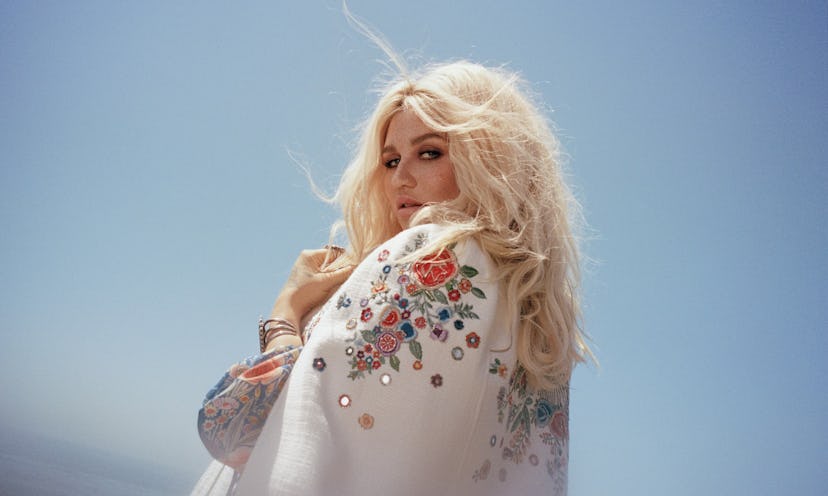On Rainbow, Kesha Revisits the Pre-Dr. Luke Kesha to Find Her Future
The most exciting thing about Kesha’s first album in five years? That she might finally become the artist she started out as.

Kesha is able to speak again. Rainbow, out at midnight this Friday, is the singer’s first album in over five years, and the first one since she’s tried to break out of her contract with Lukasz “Dr. Luke” Gottwald, after charges of sexual assault towards the pop superproducer. The legal battle between them over the past few years took over both of their lives—Dr. Luke’s once-prolific output of chart-topping hits slowed to a stop, and Kesha’s been held back from putting out new music. Rainbow, though released through the Dr. Luke contract she’s fought to get out of, it is the first piece of music to come from the singer since her 2012 album, Warrior. The narrative around the project suggests this is a new start for the singer. And emotionally, it is. But musically, she’s still relying on the forms she knows best.
The brash boldness of Rainbow is not a new pose for Kesha. Her previous pop hits were all very forward, from her initial hit “Tik Tok,” which opened with the line: “Wake up in the morning feeling like P. Diddy.” Here, there are still many tales of nights out with the girls having fun, but there is also an empowerment streak that, though present in her earlier work, now feels more inwardly reflective. “Bastard,” the album’s opener, is an unambiguous confrontation of men who wield their power over others. It doesn’t feel so far away from her past albums, where guys were often cast as dolts not on her level (“Blah Blah Blah”), but that opening establishes a different tone than in her previous work.
The fact that Rainbow isn’t a radical departure is actually to its credit, because Kesha’s ability to move between pop, EDM, occasional hip-hop, and rock is what makes her such a thrilling pop star. Her earliest biggest hits like “Your Love Is My Drug,” “We R Who We R,” and “Blow” were the maximalist early 2010’s pop songs that filled the room with fist-pumping energy. On Rainbow, that side of Kesha is reigned in a little, and she finds a new playground in country (“Finding You” and “Hunt You Down”), but the overall sound is a confetti slurry of pop and rock. In retrospect, “Party at a Rich Dude’s House,” a deep cut from her first album, Animal, now appears to have foreshadowed the best direction for her music, with its pop-punk guitars and classic punk sneer. That’s why the Eagles of Death Metal appearing on “Let ‘Em Talk” and “Boogie Feet” sounds perfectly in line with the worldview she establishes on Rainbow.
In place of the over-the-top EDM hits are instead sweeping ballads that retain the same level of pomp, but without trying so hard to fill a late night dance floor. This is best accomplished on the back-to-back tracks of “Praying” and “Hymn,” where it feels like Kesha is freed to explore musical styles that in a normal pop context might’ve been a little too out there. They’re powerful ballads, but the gospel and country twinge to the tracks shows her paving new ground in a way that feels more novel than the rest of the album.
That is the most exciting prospect of Rainbow���that perhaps Kesha can move closer towards the musician that she’s always wanted to be before pop fame took over. No song on the album sounds like a clear play for radio, nor do the collaborations scream playlist crossover potential, which is a nice reprieve when so many pop songs today increasingly feel target-marketed. The five-year gap between albums may have led Kesha to observe young female pop stars like Charli XCX, Halsey, and Lorde finding audiences and fan bases who do not necessarily represent the pure pop mainstream. Rainbow takes only a few new steps in that direction, but for Kesha those steps aren’t small.
Katy Perry confesses to crying to her own songs: